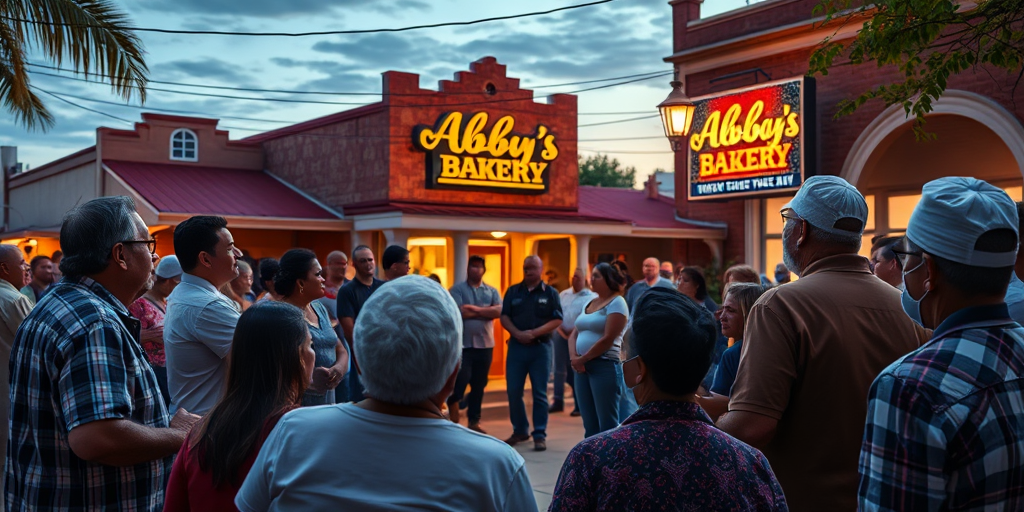Abby’s Bakery Owners Convicted for Harboring Illegal Aliens: A Deeper Look at Local Impacts and Concerns
The owners of Abby’s Bakery in Los Fresnos, Texas, were recently found guilty of harboring illegal aliens, sending ripples of concern throughout the Rio Grande Valley (RGV) community. This conviction highlights the complex socio-economic challenges facing the region, where immigration and business intersect under contentious circumstances.
Jury’s Verdict and Local Reactions
A jury found the owners guilty of illegally harboring aliens for financial gain, a verdict that underscores the enforcement of immigration laws in South Texas. The investigation revealed exploitative practices, including providing inadequate and unsafe living conditions for their undocumented workers.
“The jury’s decision reflects our commitment to enforcing immigration laws,” remarked U.S. Attorney Alamdar S. Hamdani. “This verdict should serve as a warning to business owners who exploit vulnerable individuals for profit.”
Insights Into Exploitative Practices
During the trial, it was disclosed that Abby’s Bakery, a popular local establishment, had been offering poor living conditions to its undocumented workers. Employees were housed in a small, unsafe area with little to no basic amenities. Mattresses on the floor, insufficient heating, and multiple safety violations painted a grim picture of their living conditions.
Cameron County Fire Marshall Ricardo Salinas commented, “The living situation was not just illegal, but inhumane. Housing people in such unsafe conditions is a betrayal of our community values.”
Regional Implications and Prior Incidents
This case is not isolated in the RGV, where immigration issues regularly come to a head. Local areas like Brownsville and other Cameron County cities have grappled with similar challenges as the region balances economic growth with legal compliance.
The conviction ties into broader initiatives like Operation Take Back America, a nationwide effort aimed at combating illegal immigration and criminal organizations. Special Agent Craig Larrabee of ICE-HSI San Antonio stated, “This conviction sends a clear message. There’s zero tolerance for those engaging in human smuggling and exploitation.”
Impact on Valley Residents and the Economy
The repercussions of this verdict reverberate through the local economy and community morale. Many Valley residents, who frequent local businesses, express mixed feelings, with some worried about the broader implications for local commerce.
Local economist Dr. Teresa Galvan notes, “While this verdict highlights critical legal issues, it also shines a spotlight on the dependency businesses in the RGV have on undocumented labor. There’s a need for a sustainable solution that supports both economic growth and legal employment practices.”
Community and Legislative Response
In response to the verdict, local officials have advocated for more stringent workplace inspections and better support systems for vulnerable workers. Advocacy groups are calling for reforms that protect workers’ rights regardless of their immigration status, emphasizing humane treatment over punitive measures.
A long-time resident of Los Fresnos, Maria Diaz, expressed her concerns. “Our community should stand against such exploitation. We need laws that protect, not punish, those just trying to earn a living.”
Future Considerations and Resources
Looking ahead, the case prompts a necessary dialogue about immigration reform and labor laws in the RGV. It’s an opportunity for regional and national leaders to address the underlying causes driving individuals into precarious work situations.
Valley residents can stay informed about upcoming community forums aimed at discussing immigration and labor practices. Officials are urging community engagement to shape policies that reflect both legal standards and humanitarian values.
The Texas Border Business, a key news outlet in the area, continues to provide updates on this evolving narrative, emphasizing the importance of balanced and informed discourse. Through its expansive reach across social media and print, it plays a pivotal role in connecting the RGV community with the latest developments.
In conclusion, the guilty verdict for Abby’s Bakery owners serves as a critical reminder of the ongoing struggles between commerce, legality, and ethics in South Texas. Moving forward, a comprehensive approach that involves community input and legislative support is essential for tackling these multifaceted issues.







